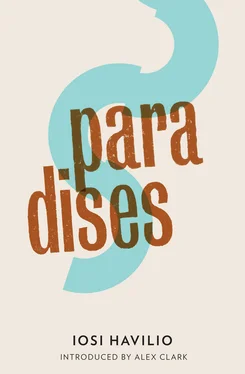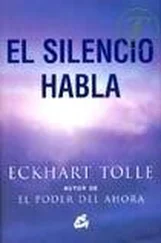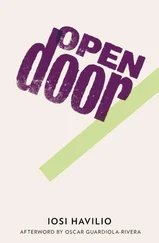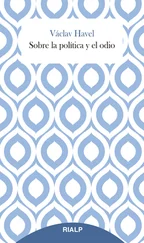Iosi Havilio - Paradises
Здесь есть возможность читать онлайн «Iosi Havilio - Paradises» весь текст электронной книги совершенно бесплатно (целиком полную версию без сокращений). В некоторых случаях можно слушать аудио, скачать через торрент в формате fb2 и присутствует краткое содержание. Год выпуска: 2013, Издательство: And Other Stories, Жанр: Современная проза, на английском языке. Описание произведения, (предисловие) а так же отзывы посетителей доступны на портале библиотеки ЛибКат.
- Название:Paradises
- Автор:
- Издательство:And Other Stories
- Жанр:
- Год:2013
- ISBN:нет данных
- Рейтинг книги:3 / 5. Голосов: 1
-
Избранное:Добавить в избранное
- Отзывы:
-
Ваша оценка:
- 60
- 1
- 2
- 3
- 4
- 5
Paradises: краткое содержание, описание и аннотация
Предлагаем к чтению аннотацию, описание, краткое содержание или предисловие (зависит от того, что написал сам автор книги «Paradises»). Если вы не нашли необходимую информацию о книге — напишите в комментариях, мы постараемся отыскать её.
is an almost perfect novel." — Albert Camus's
reimagined with a female lead in in twenty-first-century Buenos Aires.
Recently widowed, a young woman leaves the countryside for Buenos Aires with her four-year-old son where she seeks to build a new life for herself. She finds work in the zoo and moves into the human zoo of a squatted tower block at the invitation of one of its residents, to whom she acts as nurse, giving morphine injections.
Paradises — читать онлайн бесплатно полную книгу (весь текст) целиком
Ниже представлен текст книги, разбитый по страницам. Система сохранения места последней прочитанной страницы, позволяет с удобством читать онлайн бесплатно книгу «Paradises», без необходимости каждый раз заново искать на чём Вы остановились. Поставьте закладку, и сможете в любой момент перейти на страницу, на которой закончили чтение.
Интервал:
Закладка:
A security guard blocks my way at the entrance to the hospital, where am I going, My son, I say and he moves aside unwillingly, shaking his head, as if I were mocking the law. A small troop of gloved women is moving along the corridors in orange uniforms, Sonia’s competition. They clean the floors, sweep the ramps and stairs, carry enormous bags. The smell of disinfectant makes me dizzy. I carry on, not quite sure where I’m going, and when I’m opposite the chapel, this time I push the door with the stained glass. A large lady is praying or sleeping, her arms resting on the plateau of the start of her stomach, her hands covering her face. It’s a modest but pleasant chapel which, you can tell, was built without many resources. The finishes are irregular, the benches are different styles, as are the lamps, a mishmash. The altar is a plank with trestles and the cross couldn’t be more restrained. Two crossed pieces of wood, no varnish or Christ figure. A young couple enters holding hands, they sit down in the first row. They talk loudly, they converse as though they were in any other place, not noisily, just normally, a long way from prayer.
A mobile phone rings and I take a while to accept that it’s mine. The lady I thought was asleep turns her head, indignant. I squeeze the device firmly, reprimanding it, to muffle the sound, like someone gripping the hand of a child who won’t shut up. I stand up and reach the exit quickly. In that couple of seconds a chilling shiver runs through me, I think about this morning when we were admitted to hospital, the moment when the woman behind the barred window noted my details, my name, my telephone number. I think about Simón, I think the worst. Once I’m outside, I look at the screen, a message from Eloísa: IM FUCKED YOU?
Tiredness drives me into the mothers’ room. I’m scared to fall asleep, I feel as though if I close my eyes I won’t open them again. The place is crammed, there are bodies all over the place, many have already gone to bed, others are playing cards, the rest are watching television, a quiz show. The woman who spoke to me in the afternoon, the transplant one, gestures to me with her hands, her eyebrows, her lips, as if saying: I’m sorry. I find out that some children were diverted here from a provincial hospital after a bus overturned. Grab one and lie down there, she says pointing out the pile of air mattresses. She also insists I take a blanket, and I do, even though it seems absurd in this heat. In the corridor, following the example of others who have been left outside, I recognise the couple I saw in the church. I settle down next to an old lift under a large window looking over the top of a tree I can’t identify. Large leaves, dark green, drooping branches, Canetti would be able to tell me. I lie down on the bare mattress and take a while to get used to the rancid smell of the rubber. And yes, the woman was right, I feel cold, the humidity, the fear, those very high ceilings. I take off my sandals and undo my trousers, allowing the red stripe marking my waist to breathe. The silence is terrible. The clacks, the hurried steps, the screeching wheels, the crash of chains when the lift starts moving. I’m so worn out and yet my body and my mind seem to have got used to resisting, incapable of ceding even a minute of vigilance. I curl up against the wall but sleep doesn’t come. I haven’t slept since the morning of the previous day. I shiver, boiling inside. Could Simón have infected me with whatever he has? I scratch my skin, dig my nails in deeper, I’m angry with myself.
I close my eyes and see Eloísa spitting ping-pong balls out of her cunt. One after another, like a warped factory. At the edge of breathlessness, she tells me there’s still one in there. Jammed. I insert my hand, the whole arm, and she twists, killing herself with laughter. Her body becomes a glove, oily, soft, very light, for my giant’s hand, a doctor’s glove, a magician’s.
In the middle of the night I wake up perplexed, trembling. Dying of thirst.
Twenty-four
Simón is better by morning, with no fever or symptoms of anything, without much explanation either. Before seeing him, I wake up in the corridor with a woman standing shaking me by the shoulder. I come out of a deep, painful sleep, as if I’d been beaten to a pulp all night. Coming, I say as a reflex, without knowing where or why. My body responds clumsily, torturing me with every movement. I only half hear the woman’s voice, she’s watching me from above. She says I’m wanted. I try to stand up, the sun is in my eyes, I button my trousers, I can’t find my sandals anywhere. I pick up the mattress, fold the blanket, I peer through the bars of the lift with the impossible notion that they might have fallen, nothing. Who’s going to take a pair of worn-out shoes? It’s a mystery. In the mothers’ room, quietly, to keep everyone from hearing, I explain what happened to me and the maté woman, the one who must be a grandmother and not a mother, points out a basket where lost items are kept. Stuff we find round and about, she says. See if anything will do. There’s a trainer that fits, but loosely, some espadrilles that are too small and a pair of clogs that aren’t too bad on me. They must be two sizes too big, but I can walk perfectly and when I feel them escaping I keep them on by standing on the tips of my toes. All morning I have the feeling someone is treading on my heels, when it’s actually me click-clacking after myself.
A young, tanned, clean-shaven doctor is waiting for me with Simón, he introduces himself, he’s that day’s boss. He greets me with a smile. I tell him everything again, the fever, the vomiting, I tell him about the poison beads and he looks at me strangely but with interest. Yes, poison beads, he repeats with a rasping voice. I show him, I still have some in my pocket. How do you feel, he asks Simón, who from the seriousness of his gaze looks as if he’s been addressed in another language. The man checks a chart, take notes, consults a new, small nurse about something. He’s ready to go home, he says. But first we’re going to do some tests just to dispel any doubts. Yesterday’s white cell count wasn’t normal, he reminds me. Yes, I know, and I think about how we’ll need to go through the martyrdom of the needles again but apparently there’s no other way.
Because it’s morning, because Simón is much better and the danger has seemingly passed, in the light of day everything unfolds without complication. The blood flows. In the laboratory, instead of the fat man with rancid breath, there’s a woman with oval glasses, too refined for her position, who serves us quickly and hands me the results in an instant. On the way out, as I start reading, comparing the figures with the reference indices, the woman anticipates my query: Perfect, she says. The white cells are all in order.
The recovery is remarkable. While Simón dresses in the clothes I brought for him, a small medical junta forms at the foot of the bed. Between smiles, nods and arched brows, they compare yesterday’s figures with today’s, unable to find any valid explanation. They don’t say as much but they make it understood. I listen to them chatting behind me, a murmur that makes me a participant without completely including me. More than once I’m tempted to reveal the secret of the cure, the paradise bark potion. I keep quiet for fear of sounding ridiculous.
With the discharge papers in my hand, in the hospital car park, we bump into Sonia, who’s on her way to work. She greets me with her thumbs up, smiling, sure that her homemade remedy was what cured Simón. It’s more than likely. A very modern bus returns us to our neighbourhood. On the way to the flat we stop at a bar and Simón wolfs down a hamburger with the voracity of a famine victim. We arrive at the building at midday, Herbert is on the pavement playing football with the wall. As soon as he sees us, he forgets the ball and runs to meet us. At Tosca’s door I wonder whether she will have injected herself with morphine again. I knock, Benito opens, Tosca protests from the bed: Are you trying to kill me, girl. I couldn’t come any earlier, the doctors, the tests, the blood, but she doesn’t let me finish. Yes, she interrupts, I know, I know. I tell her I’ll go up, change and come right back down. Go, don’t torture me any longer. The three flights of stairs feel like ten. I need to sleep for more than a few hours in a row. A night and half a day. But I’m going to have to wait.
Читать дальшеИнтервал:
Закладка:
Похожие книги на «Paradises»
Представляем Вашему вниманию похожие книги на «Paradises» списком для выбора. Мы отобрали схожую по названию и смыслу литературу в надежде предоставить читателям больше вариантов отыскать новые, интересные, ещё непрочитанные произведения.
Обсуждение, отзывы о книге «Paradises» и просто собственные мнения читателей. Оставьте ваши комментарии, напишите, что Вы думаете о произведении, его смысле или главных героях. Укажите что конкретно понравилось, а что нет, и почему Вы так считаете.











